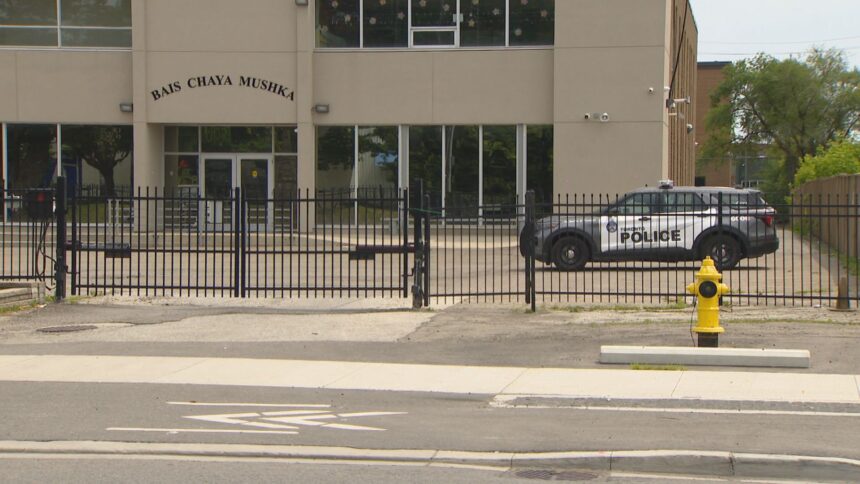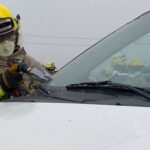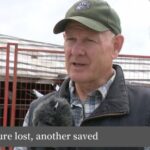I arrived at the Beth Shalom Synagogue in North York yesterday evening to find a police cruiser parked prominently at the entrance – an increasingly common sight across Greater Toronto’s religious institutions. Inside, congregants whispered about the increased security measures while Rabbi Daniel Weiss tried to maintain a sense of normalcy during evening prayers.
“We’ve always had security protocols, but now we’re implementing them with greater vigilance,” Rabbi Weiss told me after the service. “Our community feels the tension from events thousands of miles away, right here in our sanctuary.”
Across the GTA, police forces have significantly expanded patrols and security presence around synagogues, mosques, and other places of worship in response to escalating violence in the Middle East. This coordinated effort comes after intelligence sharing between Canadian security agencies identified increased risks of retaliatory incidents targeting religious communities.
Toronto Police Inspector Leila Hassan confirmed the heightened measures in a press briefing yesterday. “We’re maintaining a visible presence while conducting additional patrols around vulnerable institutions,” she explained. “This is precautionary but necessary given the global context.”
The heightened security reflects growing concerns about the spillover effects of international conflicts on local communities. Data from Statistics Canada shows hate crimes targeting religious groups increased by 27% during previous periods of Middle East tension, with both Jewish and Muslim communities reporting harassment and property damage.
At the Masjid Al-Rahman in Mississauga, volunteer security coordinator Tariq Mahmood described their community’s response: “We’ve doubled our volunteer security team and installed additional cameras. People should feel safe when they come to pray.”
Peel Regional Police confirmed they’ve assigned specialized units to maintain regular contact with religious leaders throughout the region. “This isn’t just about physical security,” said Constable Jasmine Singh. “It’s about building relationships that help us respond effectively to concerns before they escalate.”
The crisis has prompted unprecedented cooperation between faith communities. Last weekend, I attended an interfaith security workshop in Scarborough where Jewish, Muslim, Sikh, and Christian leaders shared safety protocols and discussed joint advocacy efforts.
“We refuse to import conflict,” said Imam Hassan Guillet, who participated in the workshop. “Our communities in Canada want peace, both abroad and at home.”
The financial burden of enhanced security weighs heavily on many congregations. The federal Security Infrastructure Program offers grants for religious institutions to upgrade security systems, but demand far exceeds available funding. A recent application cycle saw requests totaling $12.3 million against $4 million in available grants, according to Public Safety Canada.
York Regional Police Chief James Porter acknowledged these challenges during a community meeting in Richmond Hill. “We’re stretching our resources to meet the current needs, but we’re committed to ensuring people can worship without fear,” he said.
For many congregants, the visible security presence evokes mixed emotions. “I appreciate the protection, but it breaks my heart that we need guards outside our temple,” said Esther Cohen, a Holocaust survivor I spoke with outside a synagogue in Thornhill. “This reminds me of darker times.”
Muslim community members express similar sentiments. “My children ask why there are police cars at Friday prayers,” said Fatima Khaled, a mother of three from Brampton. “How do I explain that some people might target us because of conflicts we have nothing to do with?”
Mental health professionals report increased anxiety among religious community members. Dr. Nathan Rosenblum, a psychologist who counsels trauma survivors, told me he’s seeing more patients struggling with hypervigilance and fear. “There’s a collective trauma response occurring, particularly among those who’ve fled conflict zones or have family in affected regions.”
Local elected officials have been quick to condemn any acts of intimidation. At a press conference at Toronto City Hall, Mayor Olivia Chow stood alongside faith leaders to affirm the city’s commitment to protecting religious freedom. “Toronto’s strength comes from our diversity and mutual respect,” Chow stated. “We will not allow global conflicts to divide our communities.”
Ontario Premier Doug Ford echoed these sentiments, announcing additional provincial funding for community security initiatives. “We stand firmly against hate in all its forms,” Ford said during a visit to a Sikh gurdwara in Brampton that recently enhanced its security systems.
As tension persists in the Middle East, GTA police forces emphasize they’re prepared for a prolonged security operation. RCMP liaison officers are working with international partners to monitor potential threats, while municipal forces maintain direct communication channels with religious institutions.
For now, worshippers across the GTA continue their rituals under watchful eyes. As I left the Beth Shalom Synagogue, I noticed children playing in the courtyard while parents chatted nearby, the police cruiser still visible at the gate – a stark reminder of how distant conflicts continue to shape local realities.






